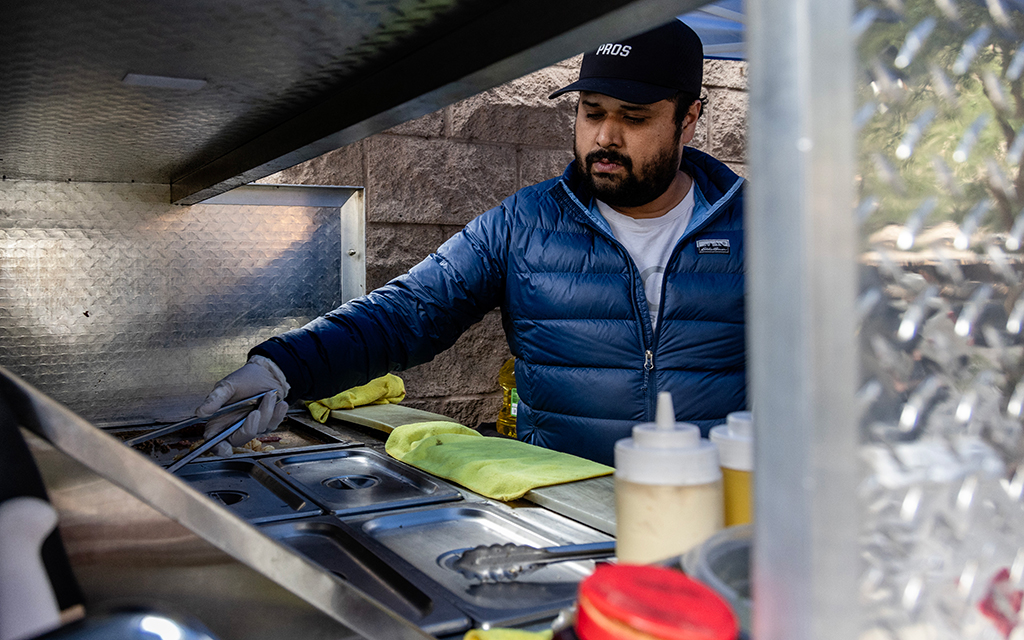
Tacos from Player Breakfast Club in downtown Phoenix on Jan. 24. (Photo by Sam Ballesteros/Cronkite News)
PHOENIX – The accordion, bass guitar and percussion harmonize seamlessly in the energetic beat of Grupo Frontera and Bad Bunny’s chart-topping corrido, “Un X100TO.” Amid the easygoing, upbeat music, the enticing sweet and salty aroma of sizzling bacon and onions from Sergio Vargas’ pushcart stovetop permeates the air of the intersection where he meticulously assembles the ingredients for his signature Sonoran hotdogs.
“The reality is that this is something (the hot dogs) that everybody likes,” Vargas said.
Originally from Guadalajara, Mexico, Vargas has been selling food at Player Breakfast Club to a diversity of people in the heart of downtown Phoenix for a year and four months.
But before Vargas spent his weekdays prepping the Sonoran hotdogs and tacos at 9 a.m. and closed shop at 10 p.m., he had to go through the process of obtaining the necessary permits and paying the fees that accompany them to set up his business in the downtown area.
According to the Arizona Department of Health Services, the sale of foods made at home, also known as cottage foods, is legal but limited to a select list of foods that do not include meat products and tamales.
HB 2042, also known as the “tamale bill,” would legalize the sale of tamales and other meat products cooked at home, by expanding upon what is defined as cottage food and a home kitchen.

Sergio Vargas, owner of Player Breakfast Club, prepares food at his taco stand on the corner of Adams and Second streets in downtown Phoenix on Jan. 24. (Photo by Sam Ballesteros/Cronkite News)
According to the bill, foods packaged and sold at home or online must contain a label that clearly states the name and registration number of the food handler and lists all of the ingredients in the food product, along with the date it was produced.
The bill also requires that the label includes this statement: “This product was produced in a home kitchen that may process common food allergens and is not subject to public health inspection.”
In addition to putting themselves on an online registry, the person preparing or supervising the preparation of the homemade foods would have to complete and maintain an active food handler’s certification, where they must display their registration certificate when operating their business.
The “tamale bill” was initially introduced in 2023 as HB 2509, and passed with bipartisan support before it was vetoed by Gov. Katie Hobbs. In her veto letter, Hobbs said the bill failed to establish minimum standards to inspect or certify cottage food businesses.
“Nor does it provide a strong enough mechanism to ensure home kitchens are free of hazardous chemicals, rodent or insect or infestation, or that equipment and storage of temperature-sensitive foods are adequate, functioning or even existent,” Hobbs’ letter said.
Rep. Travis Grantham, R-Gilbert, sponsored the bill both this year and last.
“I introduced the bill because people should have the freedom to make a living by producing home-baked goods, whether they be tamales or bread or salsas, and to sell those on the open market,” Grantham said.
The House failed to override the veto after 12 Democrats who initially voted yes changed their vote to no. Senate Democrats said they would not vote to override the veto because of health concerns brought up by health advocates after the initial vote to approve the bill.
Dan Bogert, the Arizona Restaurant Association’s chief operating officer, said the association opposed the original version of the bill because it did not provide a detailed enough definition of what constitutes a home kitchen.
In response to these criticisms, the current version of the bill provides a list of what constitutes a home kitchen. It kept the requirement from the previous bill that the vendors offer a label that discloses the food was prepared in a home kitchen that is not subject to a health inspection.
Bogert said the Arizona Restaurant Association approves of the current bill.
Vargas said the current cost to obtain the necessary permits, like the ones he paid to open his business, varies depending on the vendor’s needs.
In addition to a $30 permit fee, the application fee for a mobile food vendor’s license is $350 according to the city of Phoenix website.
“They just ask you for a lot of requirements that the reality is that if someone is doing things right, it’s not difficult,” Vargas said.
Vargas thinks the “tamale bill” will give a break to many aspiring food vendors who struggle with obtaining the necessary permits to operate a food stall or restaurant. Still, he also believes the bill can make it easier for people to use the system to assist food vendors.
While Vargas is at his stall during bad and good times, he said he has seen many hot dog carts with small cooktops and no hand wash station that only come during major events downtown.
“If I don’t do well here,” Vargas said, “they can fine me or close my business.”
But Vargas said the law could be better because authorities would shut him down if he tried to sell homemade tamales in his cart and disclosed this information to the Arizona Department of Health Services.
“I feel that it (the tamale bill) would help people who want to start a new project because the hardest part and biggest fear is applying for permits,” Vargas said.

Sergio Vargas, owner of Player Breakfast Club, cooks food in downtown Phoenix at his taco stand on Jan. 24. (Photo by Sam Ballesteros/Cronkite News)
Vargas said that his business has allowed him to meet people from all over the world, including people from England and Korea.
“From all over the United States, and everybody is here,” Vargas said. “They’ve had their first taco.”
Vargas said he also often gets customers excited at the sight of his hot dogs when they come out of the bars at night.
“Some people actually have a good time when you’re working,” Vargas said.
As the tuba and yearning voices of the Mexican corrido “Ya Supérame” by Grupo Firme played from the speakers near Vargas’ cart, he drizzled salsa and sprinkled some onions and cilantro on freshly cooked carne asada tacos.
While he prepared the ingredients for a potential next order, two young women excitedly noticed that he had the famous Sonoran hot dogs for sale, and they were surprised to learn about the number of ingredients that go into hot dogs.
They did get all the ingredients for their Sonoran hot dogs, but they were ready to try something new, and Vargas was prepared to carry on with his day serving the people of downtown Phoenix.
The bill passed the House Regulatory Affairs and the Rules committees, but has yet to come before the full House. If it survives the House and Senate, it will go to Hobbs, who has yet said whether she supports the current bill.

